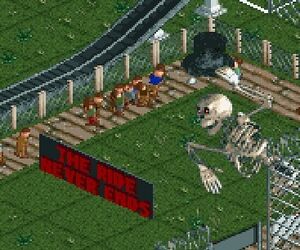Skeleton: Difference between revisions
No edit summary |
|||
| Line 10: | Line 10: | ||
Because they are hard and made of inorganic calcium and other minerals, they tend to persist after the death of their organism -- potentially for millions of years, if conditions are right. Because of this, they are often identified with death; in fact, the word ''skeleton'' comes from the Greek word for "[[mummy]]" or "dried body". Grim Reapers and other personifications of death tend to be skeletons, or at least have skulls for heads, and skeletons in general are spooky and scary to most people. | Because they are hard and made of inorganic calcium and other minerals, they tend to persist after the death of their organism -- potentially for millions of years, if conditions are right. Because of this, they are often identified with death; in fact, the word ''skeleton'' comes from the Greek word for "[[mummy]]" or "dried body". Grim Reapers and other personifications of death tend to be skeletons, or at least have skulls for heads, and skeletons in general are spooky and scary to most people. | ||
Skeletons are also a favorite choice of minion for [[necromancer]]s -- they have no flesh, which means they don't rot or smell bad, and makes them slightly more resilient to slashing damage (though hammers are quite effective, and as [[undead]], holy damage is also a good choice; some paladins call them 'hammer fodder' for this very reason). | Skeletons are also a favorite choice of minion for [[necromancer]]s -- they have no flesh, which means they don't rot or smell bad, and makes them slightly more resilient to slashing damage (though hammers are quite effective, and as [[undead]], holy damage is also a good choice; some paladins call them 'hammer fodder' for this very reason). They also tend to be just as fast as they were in life, unlike the shambling zombies, making them useful for time-critical tasks as well as fast-paced combat. Additionally, skeletons are just smart enough to wield weapons, typically the ones they used in life. | ||
== Gallery == | == Gallery == | ||
Revision as of 17:15, 14 December 2016

Spooky, scary skeletons send shivers down your spine.
Shrieking skulls will shock your soul, seal your doom tonight.
- -Andrew Gold
A Skeleton is a rigid supporting structure. It usually assumes the context of supporting a living creature, either from the inside (an endoskeleton) or the outside (an exoskeleton), but the term is also used figuratively to refer to the supporting structure of a non-living thing (e.g. the skeleton of a building). You might not realize it, but there is a skeleton inside you!
Because they are hard and made of inorganic calcium and other minerals, they tend to persist after the death of their organism -- potentially for millions of years, if conditions are right. Because of this, they are often identified with death; in fact, the word skeleton comes from the Greek word for "mummy" or "dried body". Grim Reapers and other personifications of death tend to be skeletons, or at least have skulls for heads, and skeletons in general are spooky and scary to most people.
Skeletons are also a favorite choice of minion for necromancers -- they have no flesh, which means they don't rot or smell bad, and makes them slightly more resilient to slashing damage (though hammers are quite effective, and as undead, holy damage is also a good choice; some paladins call them 'hammer fodder' for this very reason). They also tend to be just as fast as they were in life, unlike the shambling zombies, making them useful for time-critical tasks as well as fast-paced combat. Additionally, skeletons are just smart enough to wield weapons, typically the ones they used in life.
Gallery
-
Sometimes a skeleton just wants to have some fun.
-
Skeletons are not only inside humans, but other nightmarish species as well.
See Also
- Deep Rot, a skeleton-based computer constructed by a necromancer with a penchant for mad science.
External Links
- Spooky Scary Skeletons, a song that is guaranteed to play or at least be mentioned in any thread involving skeletons. It might be 2spooky4u.

